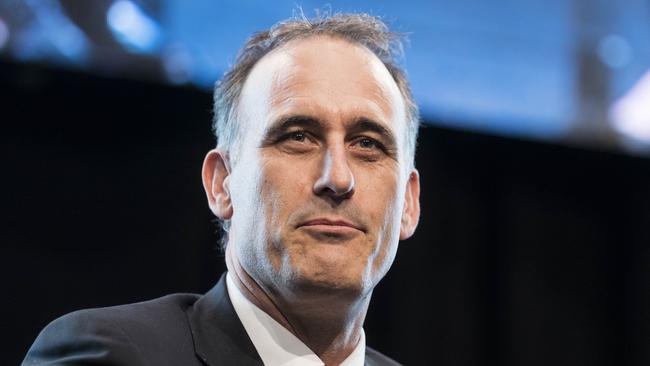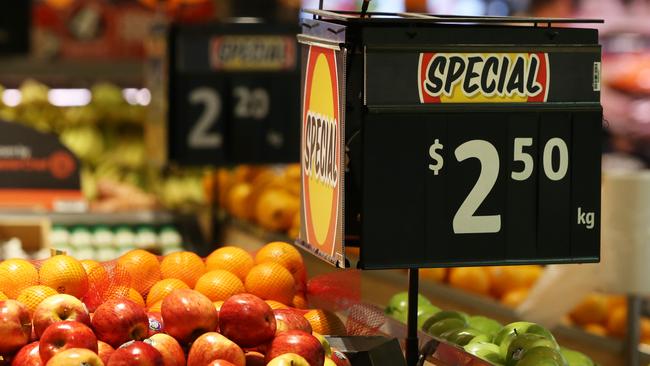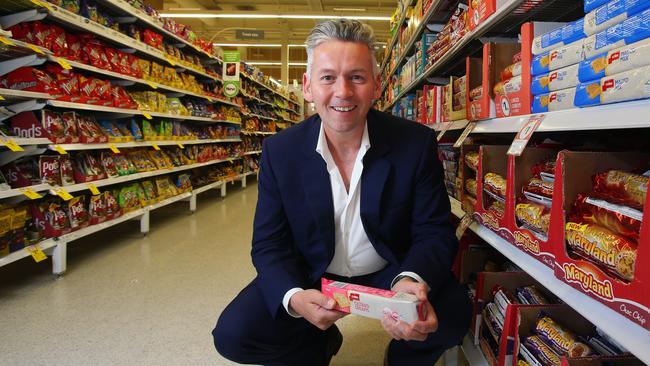Wesfarmers’ demerger of Coles a no-brainer
The spin-off of grocery giant Coles will leave Wesfarmers a much smaller group, but its returns will improve substantially.

Criticisms of Wesfarmers’ performance in recent years have centred on, by its stellar historical standards, its relatively lacklustre returns on capital, which had stagnated as what had been the remarkable momentum in Coles’ earnings growth faltered as Woolworths finally fought back.
There were two related issues.
One was that the size and diversity of the Wesfarmers’ portfolio made it difficult for the management to take decisions that significantly impacted the group’s overall performance, and the other was that a mature Coles, after Wesfarmers had ploughed $8 billion of capital into the business over the past decade, had too much of Wesfarmers’ capital locked up in it.
Indeed, there were two numbers in Wesfarmers’ presentation for the demerger that explain why the decision for Scott and his board was a “no-brainer’’. Coles accounts for 60 per cent of the group’s capital employed but contributes only 34 per cent of overall operational earnings.
The conclusion that shedding Coles would improve returns and increase options was one Wesfarmers had contemplated before Scott’s appointment last year and one that Scott put strongly to the board when making the case for his appointment. He has now acted.
That weighting within the portfolio, the extent of the discrepancy between the amount of capital tied up in it and the returns it is producing, and the low-growth and intensely competitive nature of the supermarket sector in which it operates, would make it near-impossible for Wesfarmers to produce the superior growth rate in returns it aspires to.
That’s not to say that Coles is a poor business or that Wesfarmers sees no future growth in it, just that it’s now a mature business, generating strong cash flows but modest top and bottom line growth rates.
The fact that Wesfarmers plans to demerge the Coles supermarket, liquor and convenience businesses to its shareholders and retain up to 20 per cent of the business says that it has confidence that they can produce acceptable returns, albeit not the superior returns Scott is targeting, and that are required to validate the group’s commitment to its diversified conglomerate structure.
There may also be an element of unlocked value for Wesfarmers and its shareholders from the demerger, with the group appearing to believe that Coles will be valued more highly outside Wesfarmers than within it.
The decision to distance itself from Coles points to the nature of Scott’s own ambition for Wesfarmers. He’s less concerned about simple size than performance. Wesfarmers will be a much smaller group — it will lose nearly $40 billion of revenue and $1.6 billion of earnings — but its returns will improve substantially.
Moreover, any improvement in its underperforming businesses — Target and Bunnings UK — will have a more meaningful effect on the smaller capital base and Scott will be able to contemplate, for the first time since it acquired Coles, acquisitions that can materially impact the group’s numbers.
Wesfarmers will still be a sizeable group, with nearly $30 billion of revenue, $2.4 billion of earnings before interest and tax, more than $2.5 billion of cash flow and more than $10 billion of capital employed.
Wesfarmers hasn’t yet determined what the balance sheet of the two groups will look like post-demerger but the fact that its own shareholders will be given 80 per cent of Coles and that it will have a continuing exposure to its performance signals that the de-merged entity will have a conservative balance sheet. The size of the “strategic’’ stake it will retain is constrained by its desire to ensure its shareholders get merger relief and avoid capital gains taxes.
The residual 20 per cent stake, apart from sending a message of Wesfarmers’ confidence in the outlook for Coles, which after sacrificing earnings to defend its sales base in the face of heavy investment in price by Woolworths appears to have stabilised both its sales and earnings within a more disciplined competitive environment, has a strategic dimension to it.

Scott, who earlier in his career ran Coles’ financial services division, is very enthusiastic about Coles’ flybuys loyalty program and the rich data it generates. He sees data as a valuable enabler for businesses in an increasingly digitally-driven business environment.
With the demerger Coles also announced the retirement of Coles chief executive, John Durkan, and named his successor, Steven Cain.
Durkan, managing director for the past four years and a key executive in the transformation of the business over the past decade, was one of the core group of executives identified by Wesfarmers’ key retail adviser, Archie Norman, when it acquired Coles (who’s still advising it today).
Cain, currently running Metcash’s supermarket operations, was another of Norman’s proteges involved in the turnaround of the UK supermarket group, Asda.
For him, it’s a “back to the future’’ moment. He ran the Coles business, within the then Coles Myer, for a whirlwind 14 months before being forced out in 2004 after three of his direct reports went to then Coles Myer CEO John Fletcher, threatening to resign unless Cain was axed. Fletcher, who had identified Cain as his likely successor, chose the trio rather than Cain.
Cain later surfaced as an adviser to Wesfarmers when it made its gutsy acquisition of Coles (which included Kmart, Target and Officeworks) in 2007 and, as Scott said today, implemented many of the changes he had been trying to make to the business when he was forced out. The dramatic improvement in Coles post-acquisition might suggest Fletcher made a poor call.
Durkan, who will stay on until Cain is free of Metcash, has been a major contributor to the Coles turnaround and has held his nerve during the period when Woolworths was throwing billions of dollars at its supermarket operations, determined to remain price competitive and defend market share despite the impact on earnings.

The business appears to have come through the worst of the competitive impacts, with growth in comparable store sales just re-emerging, but Durkan appears to have decided that after a decade in the group he didn’t want to make the lengthy commitment to a separately-listed Coles that would have been required.
Wesfarmers is planning to effect the demerger next financial year, with the possibility that it could occur before Christmas, although the complexity of the transaction and the importance of that season to retailers probably makes it more likely it will occur in the first half of 2019.
Once it has been executed, the boldness of Scott’s first move and his rationale for it suggests Wesfarmers may be in for some excitement. There’d be no point in dramatically downsizing the group and creating greater leverage for any subsequent transaction if that potential for enhancing returns on capital weren’t aggressively pursued.





When Rob Scott conducted his review of the Wesfarmers portfolio in the first months after being appointed chief executive the conclusion that Coles should be demerged would have been straightforward and compelling.